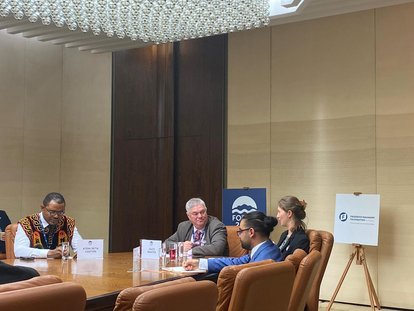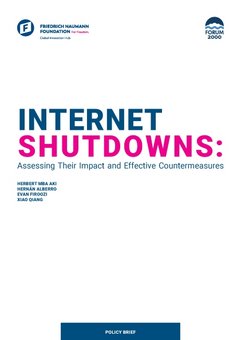Article
Internet Shutdowns: The Rising Tactic of Authoritarian Control

Imagine waking up to find your internet access completely severed—no news, no social media, and no way to contact loved ones. For millions around the world, this is a recurring reality. Authoritarian regimes increasingly use internet shutdowns to silence dissent, control information, and maintain power during periods of unrest.
As authoritarian governments become more technologically advanced, internet shutdowns have become a highly effective means of suppressing political opposition. Often justified under the guise of preventing misinformation or maintaining order, these shutdowns suppress freedom of speech, disrupt democratic processes, and cut off communication among activists.
The FNF Global Innovation Hub partnered with the Czech foundation Forum 2000 on the publication "INTERNET SHUTDOWNS: Assessing Their Impact and Effective Countermeasures" which examines the evolution of these shutdowns, their global impact, and policy recommendations to counter this repressive tactic. Authored by Herbert Mba Aki, Hernán Alberro, Evan Fioozi and Xiao Qiang, the policy brief shines a light over what governments, international organizations and democracy activists should take into account when trying to counteract this scourge.

Panel-Discussion “Defying Digital Tyranny” at Forum 2000
The topic was discussed at the session „Defying Digital Tyranny“ at Forum 2000. This session brought together experts from diverse backgrounds to discuss how authoritarian governments employ advanced technologies—such as keyword filtering, Deep Packet Inspection, and national firewalls like China’s “Great Firewall”—to control the flow of information, monitor dissent, and limit digital freedoms. The speakers included Evan Firoozi,author of the paper "INTERNET SHUTDOWNS: Assessing Their Impact and Effective Countermeasures", Ateki Seta Caxton, Executive Director, Network for Solidarity, Empowerment and Transformation for All; Zoë van Doren, Policy Advisor, Global and Innovation Hub and Iria Puyosa, Senior Research Fellow, Atlantic Council, each bringing unique perspectives on combating digital repression.
A central theme was the importance of reliable access to information as a fundamental right and a tool for empowerment, particularly in restrictive environments like Venezuela and Iran. The panelists highlighted specific government tactics used to throttle, monitor, or even completely shut down internet access, underscoring the sophisticated means by which authoritarian regimes suppress citizen voices.
To counter these repressive measures, panelists emphasized tools and strategies for activists to safely navigate online. These include VPNs, encrypted communication platforms, and decentralized internet options. The panel collectively called for increased support from global actors to empower those living under digital repression, signaling a need for sustained technological and policy-driven solutions to protect fundamental freedoms in the digital age.
Below are some notable examples of countries using internet shutdowns as a tool of repression and the recommended policies to counter them
Iran: Iran has become a frequent user of internet shutdowns to stifle protests. During the 2019 "Bloody November" protests, the government ordered a total shutdown that lasted nine days, effectively preventing activists from organizing or sharing information. This tactic has grown more sophisticated over time, allowing the regime to limit dissent more effectively.
Gabon: Gabon has also used internet shutdowns during times of political crisis. Following the contested 2016 presidential election, the government blocked social media for weeks. In 2023, during a military coup, authorities implemented a more comprehensive shutdown, cutting off all internet services for four days to prevent unrest.
Cuba: During mass protests in 2021, Cuba's government shut down social media and messaging platforms, making it difficult for demonstrators to share information. These partial shutdowns have become a regular occurrence during periods of unrest, allowing the regime to control the narrative.
China:China’s Great Firewall is a prime example of sophisticated internet censorship. The system blocks access to foreign websites and censors domestic content that the Chinese Communist Party (CCP) finds undesirable. While not a traditional shutdown, the Great Firewall limits citizens' access to information and prevents political dissent on a massive scale.
Several other countries, including Egypt, Myanmar, India, and Turkey, have also employed internet shutdowns to suppress dissent and maintain control during political crises.
Policy Recommendations
To address the growing threat of internet shutdowns, the report offers the following policy recommendations:
- Research and Development of New Tools: Governments and tech companies should develop tools that maintain internet access even in restricted environments, enabling activists and citizens to stay connected.
- Study Authoritarian Control Tactics: More research is needed to understand how regimes use technology to control information. Initiatives like NetBlocks and Ooni play a crucial role in tracking internet disruptions, and their efforts should be supported.
- Technological Training and Exchange: Democratic governments and civil society groups should provide training to activists on using tools that can bypass shutdowns. This training can help citizens stay connected during periods of restricted access.
- Public Education Programs: Raising awareness about internet freedom and teaching circumvention techniques is crucial for empowering activists in affected regions. This will increase digital resilience in countries prone to shutdowns.
- Strengthen International Standards: International organizations like the International Telecommunication Union (ITU) should advocate for stronger global standards to protect internet freedom. Democratic governments should also push for sanctions against countries that engage in severe internet shutdowns.
The full report, "INTERNET SHUTDOWNS: Assessing Their Impact and Effective Countermeasures," is available for download and provides in-depth insights into how to combat this global issue.

